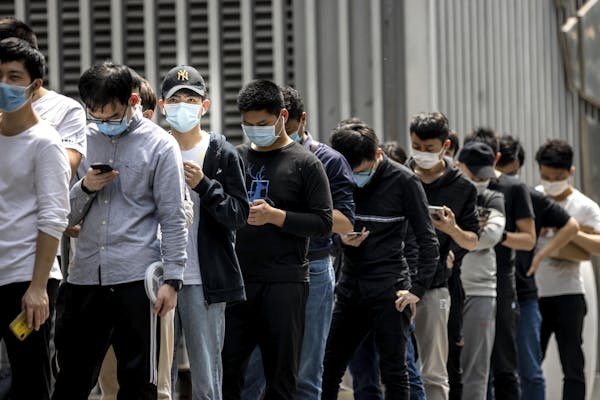Skip to comments.
'Crimson Contagion': Trump administration ran pandemic simulation months before coronavirus hit
washington examiner ^
| 3/19/2020
| Tim Pearce
Posted on 03/19/2020 8:27:35 PM PDT by bitt
click here to read article
Navigation: use the links below to view more comments.
first previous 1-20, 21-40, 41-47 last
To: Elsie
Yeah, our company had to upgrade about 2/3 its machines to new computers — all the machines tied to the accounting & inventory stuff. OTOH, my lab machines, no problem. None were web connected so I just lied to them about the date & kept track of it!
41
posted on
03/20/2020 9:46:04 PM PDT
by
Paul R.
(The Lib / Socialist goal: Total control of nothing left wort h controlling.)
To: lightman
FWIW:
Army Corps may convert empty New York City hotels into hospitals.
https://www.nytimes.com/2020/03/20/nyregion/coronavirus-new-york-update.html#link-34f7ed8c
"Trump Hospital"?
42
posted on
03/20/2020 9:51:57 PM PDT
by
Paul R.
(The Lib / Socialist goal: Total control of nothing left wort h controlling.)
To: LS
Iran has already turned away from the geometric grown line and has almost flattened. Any reports on how?
As for SK:
http://theconversation.com/coronavirus-south-koreas-success-in-controlling-disease-is-due-to-its-acceptance-of-surveillance-134068
Note the astonishing capacity of gov't surveillance of citizens and tracking capability of same. Just one part of it: I came up with 70 MILLION gov't controlled cameras to do the same job in NYC.
43
posted on
03/20/2020 10:01:51 PM PDT
by
Paul R.
(The Lib / Socialist goal: Total control of nothing left wort h controlling.)
To: Paul R.
;^)
There IS more than a singular procedure to detach the epidermis from a feline!
44
posted on
03/21/2020 5:03:05 AM PDT
by
Elsie
(Heck is where people, who don't believe in Gosh, think they are not going...)
To: bitt
There have been regular pandemic wargames since the late 1990s.
Crimson Contagion was a training exercise in deployment and use of various things, including but not limited to PPE, that would be needed in a pandemic scenario. It was not a predictive wargame like Dark Winter, Atlantic Storm, or what they are now calling Event 201.
45
posted on
03/21/2020 5:07:33 AM PDT
by
Jim Noble
(There is nothing racist in stating plainly what most people already know)
To: Paul R.
Because COVID-19 is a mild disease for most people, only a small fraction of patients tend to contact health authorities for testing based on their symptoms or known contact with infected people. Many patients with mild symptoms, especially younger ones, don’t realise they are ill and infecting others.
If these patients can’t be found, testing capacity doesn’t mean much. This is where smart city infrastructure comes in. The aim is to work out where known patients have been and test anyone who might have come into contact with them. There are three main ways people are tracked.
First, credit and debit cards. South Korea has the highest proportion of cashless transactions in the world. By tracking transactions, it’s possible to draw a card user’s movements on the map.
Second, mobile phones can be used for the same purpose. In 2019, South Korea had one of the world’s highest phone ownership rates (there are more phones than people). Phone locations are automatically recorded with complete accuracy because devices are connected to between one and three transceivers at any time. And there are approximately 860,000 4G and 5G transceivers densely covering the whole country. Crucially, phone companies require all customers to provide their real names and national registry numbers. This means it’s possible to track nearly everyone by following the location of their phones.
 Mobile phones can be used to track patients’ movements. Alex Plavevski/EPA
Mobile phones can be used to track patients’ movements. Alex Plavevski/EPA
Finally, CCTV cameras also enable authorities to identify people who have been in contact with COVID-19 patients. In 2014, South Korean cities had over 8 million CCTV cameras, or one camera per 6.3 people. In 2010, everyone was captured an average of 83.1 times per day and every nine seconds while travelling. These figures are likely to be much higher today. Considering the physical size of the country, it is safe to say South Korea has one of the highest densities of surveillance technology in the world.
http://theconversation.com/coronavirus-south-koreas-success-in-controlling-disease-is-due-to-its-acceptance-of-surveillance-134068
46
posted on
03/21/2020 5:24:14 AM PDT
by
Elsie
(Heck is where people, who don't believe in Gosh, think they are not going...)
To: bitt
47
posted on
04/04/2020 5:55:39 AM PDT
by
NetAddicted
(Just looking)
Navigation: use the links below to view more comments.
first previous 1-20, 21-40, 41-47 last
Disclaimer:
Opinions posted on Free Republic are those of the individual
posters and do not necessarily represent the opinion of Free Republic or its
management. All materials posted herein are protected by copyright law and the
exemption for fair use of copyrighted works.
FreeRepublic.com is powered by software copyright 2000-2008 John Robinson
 Mobile phones can be used to track patients’ movements. Alex Plavevski/EPA
Mobile phones can be used to track patients’ movements. Alex Plavevski/EPA